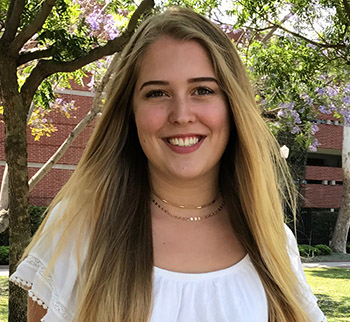
Leonie Schueler-Springorum
For the past two months, the USC Shoah Foundation communications department has had a temporary new member: Leonie Schueler-Springorum, a recent high school graduate from Germany who has been an enthusiastic assistant on a variety of communications tasks.
Schueler-Springorum and her parents are longtime family friends of Wolf Gruner, director of the USC Shoah Foundation Center for Advanced Genocide Research, and his wife Sandra Gruner-Domic, consultant on the Institute’s Guatemalan testimony collection. Following her graduation from high school, she jumped at the chance to spend two months with the Gruners in Los Angeles, interning at USC Shoah Foundation.
She was most interested in working with the communications team since she is hoping to pursue a career in journalism, particularly sports journalism.
During her time at the Institute, she worked on a variety of projects. She compiled press kits, helped edit subtitles for Armenian Genocide testimonies, and organized binders of press clippings and media mentions. She also put her skills in the German and Spanish languages to use finding and editing testimony clips from the Visual History Archive in those languages that the Institute can post on its website and social media.
Schueler-Springourm said it was particularly eye-opening to search for testimony clips about the voyage of the St. Louis – a ship that sailed from Germany to Cuba in 1939 whose over 900 passengers were Jewish refugees fleeing the Third Reich. The ship was denied entry in Cuba and sent back to Europe, where many of the passengers ultimately died in the Holocaust.
“I already know a lot of stories [about the Holocaust] but it was interesting because you still discover new stories every time and it’s interesting to listen to them,” she said. “I haven’t heard about [the St. Louis] before so this was something new and interesting.”
She said that what she’ll take away the most from her time at USC Shoah Foundation is the importance of studying and remembering history. Even though in Germany students often get tired of hearing about the Holocaust and Nazism, it’s still critical that they keep learning more about the Holocaust and other genocides.
“It’s so good to see that you don’t know everything. I also didn’t know a lot about Guatemala or about Rwanda,” she said. “I think it’s still so important to talk about history because it’s so similar to what’s happening today. For me it was again a reminder of how important history is to try to avoid this from happening again.”